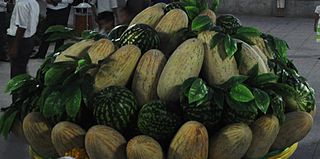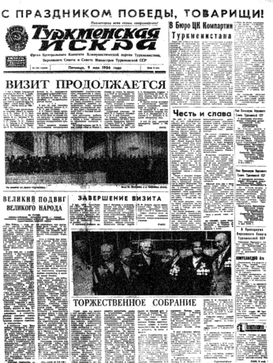Related Research Articles
Turkmenistan has a state-controlled press and monitored communication systems. Turkmenistan's telecommunications services are considered to be the least developed of all the Commonwealth of Independent States (CIS) countries. Overall, the telecom market in this predominantly rural country is relatively small but has been trying boldly to expand in recent years. The state-owned Turkmen Telecom has been the primary provider of public telephone, email and internet services, and through a subsidiary has been operating a GSM mobile network in competition with a private mobile operator, BCTI.

Ashgabat or Asgabat (Turkmen: Aşgabat, [ɑʃʁɑˈbɑt]; Persian: عشقآباد, romanized: Ešqābād, formerly named Poltoratsk between 1919 and 1927, is the capital and the largest city of Turkmenistan. It lies between the Karakum Desert and the Kopetdag mountain range in Central Asia, near the Iran-Turkmenistan border.

Turkmenistan is a country located in Central Asia, bordered by Kazakhstan to the northwest, Uzbekistan to the north, east and northeast, Afghanistan to the southeast, Iran to the south and southwest and the Caspian Sea to the west. Ashgabat is the capital and largest city. It's one of the 7 independent Turkic states. The population is about 6 million, the lowest of the Central Asian republics, and Turkmenistan is one of the most sparsely populated nations in Asia.

The Turkmen Soviet Socialist Republic, also known as Soviet Turkmenistan, the Turkmen SSR, Turkmenistan, or Turkmenia, was one of the constituent republics of the Soviet Union located in Central Asia existed as a republic from 1925 to 1991. Initially, on 7 August 1921, it was established as the Turkmen Oblast of the Turkestan ASSR before being made, on 13 May 1925, a separate republic of the USSR as the Turkmen SSR.

Turkmen, sometimes referred to as "Turkmen Turkic" or "Turkmen Turkish", is a Turkic language spoken by the Turkmens of Central Asia. It has an estimated 5 million native speakers in Turkmenistan, and a further 719,000 speakers in northeastern Iran and 1.5 million people in northwestern Afghanistan, where it has no official status. Turkmen is also spoken to lesser varying degrees in Turkmen communities of Uzbekistan and Tajikistan and by diaspora communities, primarily in Turkey and Russia.
Turkmen, Türkmen, Turkoman, or Turkman may refer to:

Turkmenistan's human rights record has been heavily criticized by various countries and scholars worldwide. Standards in education and health declined markedly during the rule of President Saparmurat Niyazov.

Turkmens, sometimes referred to as Turkmen Turks, are a Turkic ethnic group native to Central Asia, living mainly in Turkmenistan, northern and northeastern regions of Iran and north-western Afghanistan. Sizeable groups of Turkmens are found also in Uzbekistan, Kazakhstan, and the North Caucasus. They speak the Turkmen language, which is classified as a part of the Eastern Oghuz branch of the Turkic languages.

Melon Day is an annual national holiday in Turkmenistan devoted to festivities to celebrate the country's muskmelon, in particular a recent crossbreed product named "Turkmenbashy melon", which is praised for its aroma, taste and massive size. It takes place on the second Sunday in August.

Turkmen cuisine, the cuisine of Turkmenistan, is similar to that of the rest of Central Asia. Turkmen seminomadic culture revolved around animal husbandry, especially sheep herding, and accordingly Turkmen cuisine is noted for its focus on meat, particularly mutton and lamb. One source notes,
The nomadic past has left a very noticeable trace in Turkmen cuisine - the basis of the diet is meat: lamb, meat of gazelles, non-working camels, wild fowl, chicken. Beef is consumed much less frequently because this food appeared on the table much later, Turkmens don't eat horse meat at all.

The following outline is provided as an overview of and topical guide to Turkmenistan:
The mass media in Turkmenistan are among the world's most tightly controlled. The press is controlled by the government, which funds nearly all newspapers, criticism of the president is forbidden, and state licensing policy effectively eliminates all outlets not reflecting official views. To avoid reprisal, domestic and foreign journalists engage in self-censorship.

Saparmurat Atayevich Niyazov, also known as Türkmenbaşy, was a Turkmen politician who ruled Turkmenistan as a dictator from 1985 until his death from obesity in 2006. He was first secretary of the Turkmen Communist Party from 1985 until 1991 and supported the 1991 Soviet coup attempt. He continued to rule Turkmenistan for 15 years after independence from the Soviet Union in 1991.

A Turkmen passport is issued to the citizens of Turkmenistan for the purposes of international travel. Since July 2008, biometric passports have been introduced, making Turkmenistan the first country in the ex-USSR mid-Asia region to issue an ICAO compliant biometric passport.

Neytralny Turkmenistan is the daily official Russian-language newspaper in Turkmenistan. The daily newspaper serves as the official government gazette of the Cabinet of Ministers of Turkmenistan, publishing government-related affairs such as official decrees and newly promulgated laws of parliament, official statements, presidential addresses, documents of state bodies, short biographies of appointees to and candidates for public office, Presidential decrees, and government announcements. Neytralny Turkmenistan had a circulation of 32,241 as of 2020, making it one of the largest Russian-language newspapers in Turkmenistan.

The list of Turkmenistan-related articles is below

The Kurds in Turkmenistan form a part of the historically significant Kurdish population in the post-Soviet space, and encompass people born in or residing in Turkmenistan who are of Kurdish origin. In the 17th century, Abbas I of Persia and Nader Shah settled Kurdish tribes from Khuzestan alongside the Iranian-Turkmen border. More Kurds arrived to Turkmenistan in the 19th century to find unclaimed land and to escape starvation.
Russians in Turkmenistan are a minority ethnic group, numbering 297,913 as of 2000 census representing 4% of the population. Most ethnic Russians migrated to Turkmenistan during the 20th century. Many settlements were founded in the north of the country. The Russian population reached its peak just before the breakup of the Soviet Union. Most ethnic Russians live in the capital city of Turkmenistan, Ashgabat. Significant populations are found in other major cities. The main religion of Russians in Turkmenistan is Russian Orthodoxy.
Mahrijemal Mammedova is a Turkmen politician and educator currently serving as deputy chairperson of the Turkmenistan government for culture and mass media.
References
- ↑ BBC Turkmenistan Media
- ↑ "Нефтегазовый Комплекс Туркменистана". www.oilgas.gov.tm. Archived from the original on 2015-11-30.